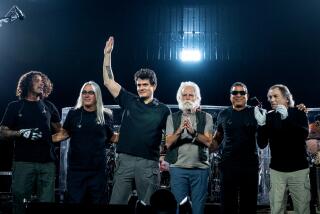Academic fest for the Grateful Dead
- Share via
Grateful Dead drummer Mickey Hart says he and other members of the band never really understood the forces that turned them into a 30-year cultural phenomenon.
“It was an alchemical thing,” Hart said. “It’s for other people to decide our fate in history, our place in the culture.”
That is exactly why fans, followers and some of those who were in the inner circle of the Grateful Dead plan to travel to the University of Massachusetts for three days beginning Friday.
This is no music festival.
The Amherst campus is hosting an academic conference on all things Dead. It will feature panel discussions on topics as diverse as the band’s innovations in sound engineering, the symbolism in Robert Hunter’s lyrics, the sociological phenomena associated with the nomadic fans who followed the Dead from concert to concert, and the band’s reflection of the American culture throughout the 30 years they were making music.
Jerry Garcia, whose death in 1995 brought an end to the band, might have called this “Thinking Man’s Dead.” The university has labeled it “Unbroken Chain: The Grateful Dead in Music, Culture and Memory.”
“We have the opportunity to do something a bit more unique than have a bunch of people sitting around talking about favorite concert memories,” said Rob Weir (no relation to Dead guitarist Bob Weir), a visiting lecturer at the school whose history classes on pop culture use the band as their fulcrum.
More than 50 historians, authors and critics are scheduled to participate, along with some who have a closer connection to the band, including Carolyn Garcia, Jerry’s second wife; Dan Healy, the band’s sound engineer; and Dennis McNally, the Dead’s publicist and biographer.
McNally, who has a doctorate in history from the University of Massachusetts, came up with the idea for the conference and suggested it to John Mullin, dean of the graduate school.
“Here was an opportunity for us to take a broad look at the late ‘60s and ‘70s through the lens of music and culture,” Mullin said. “So I brought together a bunch of scholars on this thing and I said, ‘Can we do this with scholarly rigor?’ And the answer was yes.”
Invitations to the conference have been issued to the band members, but scheduling conflicts make it unlikely that any will attend.
More to Read
The biggest entertainment stories
Get our big stories about Hollywood, film, television, music, arts, culture and more right in your inbox as soon as they publish.
You may occasionally receive promotional content from the Los Angeles Times.










